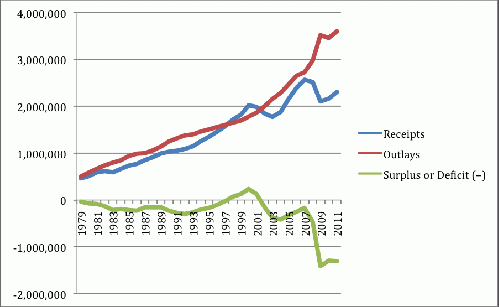The looming debt ceiling debate is puzzling on a number of levels. Among them, some people would have you believe the debt crisis is about failure of fiscal responsibility on the part of the federal government. They portray a government engaged in wanton spending that must be reined in: i.e. the government is perceived as living beyond its means. At any rate, it appears this narrative has gained traction with the American people. Part of the narrative is the repeated claims that we don't have no revenue problem: we have a spending problem. It seems an assertion like this repeated ad nauseum wafts on compliant brains where it assumes a veneer of believability. Yet, no amount of verbal repetition can endow a lie with truth. But, alas, in the theater of politics a lie can be seen as true if it is repeated often enough. That would be fine if it ended there. But it often does not. It can lead to the crafting of policies that damage the economy and can cause people to vote for candidates who perpetrate the lie.
Congress holds the purse
Congress controls the purse strings as mandated by the Constitution. And the government has bills to pay. However, that responsibility rests with the president. These bills include wages for government workers, soldiers, contractors, Medicare and Social Security benefits, etc. If the debt ceiling isn't raised these bills will not get paid--the government defaults and its credit rating gets dinged. This is not a path the country needs to venture on again. It does nothing for job creation and economic growth.
Sources of government revenues are income taxes, corporate taxes, taxes on interest, rents, dividends, capital gains, etc. Government expenses derive from appropriations or authorizations of the Congress. Because of the global recession, government revenues have declined and government expenditures have increased. In a recession business output declines when demand falls, workers become redundant, and cannot pay taxes. Now when government expenditures exceed government revenues, the results are deficits, which can be financed by issuing debt--government bonds. That is, the government borrows to make up the shortfall in revenues. For instance, in 2012 government expenditures were $ 3,795,547 million and government revenues were $2,468,599 million . The difference (-$1,326,948 million) denotes the addition to the debt obligation of the federal government. Congress approved these expenditures. Now it is threatening not to pay its creditors if it cannot coerce cuts in spending elsewhere. This fiasco occurred during the Clinton Administration, and again in the Obama Administration. In the latter case, the resolution of the debt crisis led to an S&P credit rating downgrade of the United States.
Now, history repeats itself, for to avoid a government shutdown, Republicans demand President Obama cut entitlements. These entitlements were paid for from payroll taxes extracted from workers (and their employers).
To fix the deficit, the government could sell off some assets--maybe at a discount to foreign buyers. Or the government could raise taxes--of course, this is unpopular. It is unpopular because no one wants to pay more taxes. Further, higher taxes reduce disposable income that people spend on goods and services. And less private consumer spending can hurt the economy. On the other hand, cuts in public (government) spending can stall the economic recovery and/or plunge the economy into another recession. When the government cuts spending, the people on whom the government spends won't be happy--for instance, Medicare recipients and people on unemployment compensation. Generally, cuts in private and public spending in a weak economy, all in the name of repairing the deficit, as a policy are short sighted and wrong minded.
Historical
data on government revenues, outlays, and deficits
Figure 1 below illustrates the behavior of government revenues, outlays, and deficits from 1979 to 2012 (est.). From 1998 to 2001 government revenues outstripped government outlays. Apart from that, outlays tromp receipts. (Data source: Office of Management and Budget)
Figure 1 - Gov't spending, income, and deficits 1979-2012
Two government shutdowns occurred in 1995 (from November 14th to 19th) when President Clinton refused to accept, vetoed, the spending bill the Republican-controlled Congress sent him. And again from December 16, 1995 to January 6, 1996, Congress wanted among other things to raise premiums of Medicare Part B. In 2008 government spending continued its steep rise (red line in Figure 1), while government revenues fell (blue line in Figure 1). The net effect of these two events is a U.S. deficit that fell off the cliff (see the bottom green line in Figure 1). However, this did not happen in a vacuum. There was a global meltdown of the financial markets, and a recession in the U.S. second only to the Great Depression of 1929. To combat this, President Obama waged war with Congress over stimulus spending, which, of course, once it was enacted increased the deficit. Deficits are the Keynesian prescriptions for bad economic times. And while the Obama stimulus was modest, ultimately, these deficits prevented the economy from going over the cliff, but also used to caused bad political things to happen--squabbles over the debt limit, and a credit rating downgrade.
(Note: You can view every article as one long page if you sign up as an Advocate Member, or higher).





